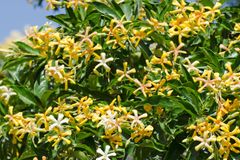Hymenosporum flavum: Difference between revisions
Created page with '{{SPlantbox |Temp Metric=°F |jumpin=If this plant info box on watering; zones; height; etc. is mostly empty you can click on the edit tab and fill in the blanks! |image=Upload.p…' |
No edit summary |
||
| Line 1: | Line 1: | ||
{{SPlantbox | {{SPlantbox | ||
|Temp Metric=°F | |Temp Metric=°F | ||
|min_zone=on | |||
|max_zone=on | |||
|jumpin=If this plant info box on watering; zones; height; etc. is mostly empty you can click on the edit tab and fill in the blanks! | |jumpin=If this plant info box on watering; zones; height; etc. is mostly empty you can click on the edit tab and fill in the blanks! | ||
|image= | |image=Native Frangipani (Hymenosporum flavum).jpg | ||
|image_width=240 | |image_width=240 | ||
}} | }} | ||
| Line 14: | Line 16: | ||
==Cultivation== | ==Cultivation== | ||
Hymenosporum flavum will adapt to most soil types, from sandy to clay soils. It prefers a sunny spot in your garden. However, it will grow quite successfully in a semi-shaded spot or even dappled shade. | |||
===Propagation=== | ===Propagation=== | ||
| Line 20: | Line 22: | ||
===Pests and diseases=== | ===Pests and diseases=== | ||
Under certain conditions, you might find your plant infested with scale insects. These will usually appear as small dark bumps or white cottony specks on the stems and sometimes, the foliage. | |||
==Varieties== | ==Varieties== | ||
| Line 42: | Line 44: | ||
==External links== | ==External links== | ||
*{{wplink}} | *{{wplink}} | ||
{{stub}} | {{stub}} | ||
__NOTOC__ | __NOTOC__ | ||
Revision as of 23:02, 13 September 2023
| subsp. var. | ||||||||||||||||||||||||||||||||||||||||||||||||||||||||
|---|---|---|---|---|---|---|---|---|---|---|---|---|---|---|---|---|---|---|---|---|---|---|---|---|---|---|---|---|---|---|---|---|---|---|---|---|---|---|---|---|---|---|---|---|---|---|---|---|---|---|---|---|---|---|---|---|

|
|
| ||||||||||||||||||||||||||||||||||||||||||||||||||||||
| ||||||||||||||||||||||||||||||||||||||||||||||||||||||||
Describe the plant here...
| Standard Cyclopedia of Horticulture |
|---|
|
Hymenosporum flavum, F. Muell. (Pittosporum flavum, Hook. f.). Shrub or tree, to 50 ft.: lvs. obovate, entire, to 9 in. long: fls. yellow, marked with red at the throat, fragrant, over 1 in. across: caps, compressed, 1 in. long and nearly as broad. B.M. 4799. R.H. 1913, p. 327. Alfred Rehder.
The above text is from the Standard Cyclopedia of Horticulture. It may be out of date, but still contains valuable and interesting information which can be incorporated into the remainder of the article. Click on "Collapse" in the header to hide this text. |
Cultivation
Hymenosporum flavum will adapt to most soil types, from sandy to clay soils. It prefers a sunny spot in your garden. However, it will grow quite successfully in a semi-shaded spot or even dappled shade.
Propagation
Pests and diseases
Under certain conditions, you might find your plant infested with scale insects. These will usually appear as small dark bumps or white cottony specks on the stems and sometimes, the foliage.
Varieties
Gallery
-
photo 1
-
photo 2
-
photo 3
References
- Standard Cyclopedia of Horticulture, by L. H. Bailey, MacMillan Co., 1963
External links
- w:Hymenosporum flavum. Some of the material on this page may be from Wikipedia, under the Creative Commons license.
- Hymenosporum flavum QR Code (Size 50, 100, 200, 500)
